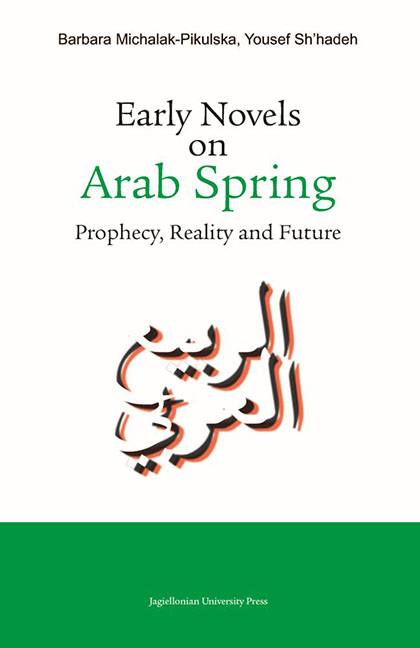Book contents
- Frontmatter
- Contents
- Introduction
- Part I Awakening of the Awareness of Subjugation – The Prophecy of the Spring of Nations in Arab Novels
- Part II At the Heart of the Arab Spring Events
- Part III The Future: The Spring Continues
- 17 Mu‘Taṣim Aš - Šā‘Ir : Uhzūǧat ar-raḥīl (A Song of Departure) and Fī intiẓār as-sulaḥfāt (Waiting for a Turtle)
- 18 Aḥmad ‘Abd Al - Malik : Al-Aqni‘a (Masks)
- 19 Ṭayba Aš - Šarīf Al - Idrīsī : Ḥaǧar min saqar (A Stone from Hell)
- 20 Amīra Aš - Širbīnī : ‘Itq (Liberation)
- 21 ‘ Izz Ad - Dīn Šukrī Fašīr : Bāb al-ẖurūǧ – risālat ‘Alī al-muf‘ama bi-bahǧa ġayr mutawaqqa‘a (The Gate to Leave – Ali’s Letter Filled with Unexpected Joy)
- Conclusion
- Bibliography
- Summary in Arabic
Introduction
Published online by Cambridge University Press: 13 October 2023
- Frontmatter
- Contents
- Introduction
- Part I Awakening of the Awareness of Subjugation – The Prophecy of the Spring of Nations in Arab Novels
- Part II At the Heart of the Arab Spring Events
- Part III The Future: The Spring Continues
- 17 Mu‘Taṣim Aš - Šā‘Ir : Uhzūǧat ar-raḥīl (A Song of Departure) and Fī intiẓār as-sulaḥfāt (Waiting for a Turtle)
- 18 Aḥmad ‘Abd Al - Malik : Al-Aqni‘a (Masks)
- 19 Ṭayba Aš - Šarīf Al - Idrīsī : Ḥaǧar min saqar (A Stone from Hell)
- 20 Amīra Aš - Širbīnī : ‘Itq (Liberation)
- 21 ‘ Izz Ad - Dīn Šukrī Fašīr : Bāb al-ẖurūǧ – risālat ‘Alī al-muf‘ama bi-bahǧa ġayr mutawaqqa‘a (The Gate to Leave – Ali’s Letter Filled with Unexpected Joy)
- Conclusion
- Bibliography
- Summary in Arabic
Summary
In the history of every nation there are times when a man cannot behave indifferently. In order not to lose faith in the meaning of life, he must muster up the courage to fight for his freedom and dignity. This struggle is accompanied by moments of hesitation and dilemma. In their novels about the Arab Spring, Arabic writers clearly write about the crisis of twenty-first-century civilization; of a time when moral values and principles were shaken and all norms in these countries were bent for the needs of ideology. In their works they try to write the truth about man and the world to which he had to adapt, often without a choice. They reconstruct events and characters for future generations. They describe the mechanisms of coming to power and its loss, the crimes committed in this process, and they try to find a way to remedy this vicious cycle.
Arab novelists quickly reacted to an important event, which was the emergence of the Arab Spring and wrote a large number of novelistic works in a very short time, despite the fact that the Spring itself continues. This haste was probably the reason for some of these novels’ rather superficial and generalizing treatment of many important themes, as if the authors lacked patience and time to properly develop them, which is necessary when writing longer prose forms.
The contemporary novel, and prose in general, is realized through various ways of describing the world – it tries to be a reflection of the era, expressing its social emotions and moods. It is difficult to classify it explicitly. It is carried out on the border of a novel, diary, essay or reportage. The authors often use the behavioral method, that is, they register behaviors and gestures, avoiding commenting and assessing them. They try to convey revolutionary reality without ideological distortions. A language intelligible to the audience – using local dialects – has contributed to this new way of expressing a particular sensitivity and imaging the world.
The analyzed novels describe countries in which regimes were overthrown by revolution, where leaders were removed and power was taken over by persecuted and hurt people.
- Type
- Chapter
- Information
- Early Novels on Arab SpringProphecy, Reality and Future, pp. 7 - 10Publisher: Jagiellonian University PressPrint publication year: 2022

